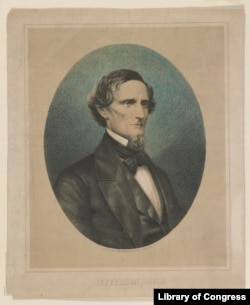From VOA Learning English, this is The Making of a Nation. I’m Kelly Jean Kelly.
And I’m Christopher Cruise.
South Carolina withdrew from the United States on December 20, 1860. South Carolina seceded because a Republican, Abraham Lincoln, had been elected president. Republicans wanted to stop slavery from spreading.
But South Carolina and other southern states said they had a right to take property -- which, they believed, included slaves -- anywhere.
U.S. lawmakers debate
When South Carolina seceded, Abraham Lincoln had not yet taken office. James Buchanan was still president. His advisors were deeply divided about what to do.
The southern advisors wanted him to recognize South Carolina’s independence. They said the president should order all federal troops out of the state – especially out of Charleston Harbor.
But northern advisors said the president must not give up any federal property or rights. The attorney general and the secretary of state even threatened to resign if President Buchanan agreed to South Carolina's demands.
Buchanan finally agreed with his northern advisors. He said he would defend U.S. government property against all hostile action.
On the last day of 1860, he ordered the army to send federal troops and extra supplies to a military base in Charleston Harbor called Fort Sumter.
Congress tried to find a compromise that might prevent war. Lawmakers proposed a new line across the country. South of the line, slavery would be permitted. North of the line, slavery would be illegal.
Many Republicans supported the proposal. But at least one rejected the idea completely. Abraham Lincoln said there could be no compromise on extending slavery.
"If there is," he said, "then all our hard work is lost. If trouble comes, it is better to let it come now than at some later time."
The South writes a new constitution
The trouble came soon. By February 1, 1861, the southern states of Mississippi, Florida, Alabama, Georgia, Louisiana and Texas followed South Carolina out of the Union.
Their representatives met in Montgomery, Alabama. They agreed to create a new nation. It would be an independent republic called the Confederate States of America.
The convention approved a constitution for the new nation. The document was like the Constitution of the United States, but with major changes. The Confederate Constitution gave greater importance to the rights of states. And it said there could be no laws against slavery.
Jefferson Davis leads the Confederacy
The convention named former United States senator Jefferson Davis to be president of the Confederate States of America.
Davis did not want civil war. But he was not afraid of it. He said: "Our separation from the old Union is complete. The time for compromise has passed. Should others try to change our decision with force, they will smell southern gunpowder and feel the steel of southern swords."
Jefferson Davis left his farm in Mississippi to become president of the Confederate States of America on February 11.
On that same day, Abraham Lincoln left his home in Illinois to become president of the United States.
I’m Christopher Cruise.
And I’m Kelly Jean Kelly.
This is The Making of a Nation from VOA Learning English.
______________________________________________________________
Words in the News
seceded - v. separated from a nation and became independent
confederate - n. ally
gunpowder - n. a dry explosive used in guns
steel - n. a strong, hard metal
Editor's Note: Thank you for the questions about our colleague Steve Ember. He has retired from Voice of America. Steve gave his voice and talents to a number of programs at VOA. Many listeners learned about world news and US history from Steve. We miss him, too, and we wish him well.






